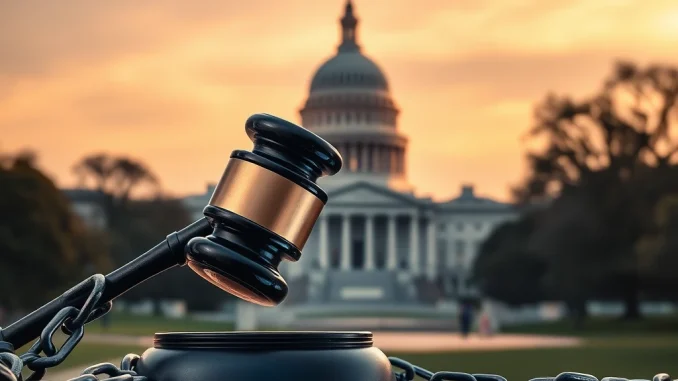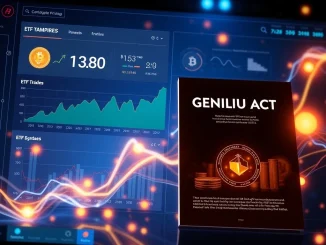
Get ready for round two! The U.S. Senate is set to revisit a contentious issue that could dramatically reshape the landscape of decentralized finance (DeFi). After a technical hiccup marred the initial vote, the Senate is scheduling a second vote this evening to decide the fate of the controversial DeFi broker rule. Will the crypto industry score a victory, or is tighter regulation on the horizon? Let’s dive into what this all means for you and the future of crypto.
DeFi Broker Rule Under Fire Again: What’s at Stake?
At the heart of this legislative battle is the DeFi broker rule, a mandate that has sent ripples of concern throughout the crypto world. But what exactly is this rule, and why is it causing such a stir?
In essence, the rule mandates that DeFi brokers must report the total proceeds from digital asset sales. Sounds simple enough? Not quite. The crypto industry argues this rule is overly broad, technically challenging to implement in the decentralized world of DeFi, and could stifle innovation. Critics argue it treats DeFi protocols and participants like traditional financial intermediaries, which they fundamentally are not.
Here’s a breakdown of why the crypto industry is up in arms:
- Privacy Concerns: DeFi is built on principles of decentralization and pseudonymity. Reporting requirements could compromise user privacy.
- Technical Hurdles: Defining who exactly qualifies as a “DeFi broker” and how they are supposed to collect and report data in a decentralized ecosystem is a massive technical challenge.
- Innovation Chill: Many fear that overly burdensome regulations like this could stifle the rapid innovation that characterizes the DeFi space, pushing development and talent overseas.
- Compliance Costs: The cost of compliance could be prohibitive, especially for smaller DeFi projects and platforms, potentially leading to market consolidation and reduced competition.
Senate Vote Showdown: Second Chance for Crypto Regulation Repeal
After the initial vote on April 4th was derailed by a technical issue, the Senate is giving it another go. According to reports from Eleanor Terrett, a procedural vote is slated for 5 p.m. this evening, followed by a final passage vote expected around 8 p.m. This second Senate vote is crucial. If the resolution to overturn the DeFi broker rule passes again in the Senate, it will then move to President Trump for final approval.
This isn’t just a procedural matter; it’s a significant moment for the crypto regulation debate in the U.S. The outcome of this vote could signal the direction Washington is heading in when it comes to governing the burgeoning digital asset space. Will they embrace innovation or opt for a more restrictive approach?
Digital Asset Sales Reporting: The Core of the Controversy
The requirement to report total proceeds from digital asset sales is the sticking point. While the intention behind such rules might be to increase transparency and prevent illicit activities, the crypto industry argues that the current framework is ill-suited for DeFi.
Let’s consider the complexities:
| Aspect | Traditional Finance | Decentralized Finance (DeFi) |
|---|---|---|
| Intermediaries | Centralized brokers, exchanges | Decentralized protocols, smart contracts |
| Data Collection | Relatively straightforward for centralized entities | Complex and technically challenging in decentralized systems |
| User Privacy | Established frameworks, but still concerns | Privacy is a core principle, reporting can conflict |
| Regulatory Framework | Well-established, though constantly evolving | Still in early stages of development and understanding |
As you can see, applying traditional financial regulations directly to DeFi presents significant challenges. The industry is advocating for a more nuanced approach, one that acknowledges the unique characteristics of DeFi and fosters innovation while addressing legitimate concerns around illicit finance.
Crypto Industry United Against Regulatory Overreach
The crypto industry has shown remarkable unity in its opposition to the DeFi broker rule. From major exchanges to smaller DeFi projects, the consensus is clear: this rule, in its current form, is detrimental to the growth and development of the crypto ecosystem in the United States.
Industry leaders and advocacy groups have been actively lobbying against the rule, emphasizing the potential negative consequences:
- Reduced Competitiveness: Stricter regulations could make the U.S. less attractive for crypto businesses, potentially driving innovation and talent to more crypto-friendly jurisdictions.
- Hindered Adoption: Overly complex or burdensome regulations could discourage mainstream adoption of cryptocurrencies and DeFi technologies.
- Unintended Consequences: Regulations designed without a deep understanding of DeFi could have unintended negative consequences, potentially harming users and the market.
Decoding the DeFi Broker Rule: Benefits and Challenges
While the DeFi broker rule is largely opposed by the crypto industry, it’s important to consider the arguments in favor of regulation, even as we acknowledge the challenges.
Potential Benefits (from a regulatory perspective):
- Increased Tax Compliance: Reporting requirements could lead to better tax compliance in the crypto space.
- Combating Illicit Finance: Enhanced transparency could help in efforts to combat money laundering and other illicit activities using cryptocurrencies.
- Investor Protection: Regulations could be framed as a way to protect investors in the often volatile and complex world of DeFi.
However, the challenges, as highlighted earlier, are substantial. The key lies in finding a balance – regulations that are effective in achieving their intended goals without stifling innovation and pushing the industry underground or offshore.
The Clock is Ticking: What Happens Next?
As the Senate prepares for this crucial second vote, the crypto world watches with bated breath. The outcome will have far-reaching implications for the future of DeFi and the broader crypto industry in the United States. If the resolution passes, it will be a significant win for the industry, demonstrating the power of advocacy and highlighting the need for more thoughtful and nuanced crypto regulation.
However, even if it passes the Senate and gains presidential approval, this is likely just one battle in a larger war. The debate around crypto regulation is far from over, and the industry must remain vigilant and proactive in engaging with policymakers to shape a regulatory framework that fosters innovation while addressing legitimate concerns. Stay tuned as the drama unfolds in Washington this evening – the future of DeFi could be hanging in the balance!



